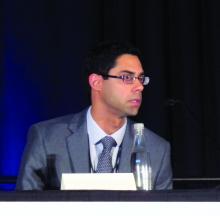ORLANDO – Combination pepinemab and avelumab is well tolerated and shows antitumor activity in patients with advanced non–small cell lung cancer (NSCLC) who progressed on prior treatment, according to interim results from a phase 1b/2 trial.
Treatment with pepinemab, an anti–semaphorin 4D antibody, and avelumab, a programmed death-ligand 1 (PD-L1) inhibitor, produced disease control rates of 59% in immunotherapy-resistant patients and 81% in immunotherapy-naive patients.
Michael Rahman Shafique, MD, of Moffitt Cancer Center in Tampa, Fla., reported these results at the ASCO-SITC Clinical Immuno-Oncology Symposium.
The CLASSICAL-Lung trial initially enrolled 12 immunotherapy-naive patients with stage IIIb/IV NSCLC into a dose-escalation phase that examined pepinemab at doses of 5, 10, and 20 mg/kg along with 10 mg/kg of avelumab every 2 weeks.
Then, the trial enrolled 50 stage IIIb/IV patients – including 18 immunotherapy-naive patients and 32 who failed prior immunotherapy – into a phase 2 dose-expansion phase.
The 10 mg/kg pepinemab dose and 10 mg/kg avelumab dose were selected for the expansion phase based on the dose-escalation results, Dr. Shafique said. He explained that all three doses were safe, but “we were saturating the target at the 10-mg dose.”
Efficacy and safety
“In general, the safety data were encouraging,” Dr. Shafique said. “This was a very well-tolerated combination with no concerning safety signals. The most common adverse events were grade 1 and grade 2 fatigue, chills, pyrexia, and no grade 5 events attributable to the combination were reported.”
In the efficacy analysis, there were 29 evaluable patients who received pepinemab and avelumab after progressing on prior immunotherapy and were followed for at least 6 months. Two of these patients experienced a confirmed partial response (PR), and 15 had stable disease, for a disease control rate of 59%. Five patients had durable clinical benefit lasting at least 23 weeks, and three remained on active treatment at last follow-up, including one who had been on treatment for more than a year.
Of 21 evaluable immunotherapy-naive patients followed for at least 6 months, 5 experienced a confirmed PR, and 12 had stable disease, for a disease control rate of 81%. Three patients had clinical benefit lasting at least a year, and two remained on study and continued to receive treatment at last follow-up.
Pre- and on-treatment biopsies performed on the same lesion about 5 weeks apart demonstrated “a pretty drastic reduction in viable tumor,” Dr. Shafique noted.
“Even in patients with stable disease, many of them had absent tumor on these repeat, on-treatment biopsies,” he said, also noting that CD8-positive T-cell density increased in most tumors following treatment in patients who had a PR or stable disease, and the levels appeared to correspond with response.
Mechanism of action
Despite advances in immunotherapy, NSCLC patients often are refractory or acquire resistance to currently available agents, but semaphorin 4D “seems to shift the balance in the microenvironment to one of myeloid-induced immune suppression and generally a protumor, if you will, microenvironment,” Dr. Shafique said.


